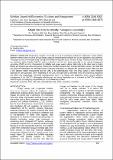Le Kenya National Drama Festival: identité culturelle dans un corpus dramatique anglophone et francophone
Abstract/
This study analyszes the representation of cultural identity in sixteen drama texts written by Kenyans in English and in French for the Kenya National Drama Festival (KNDF). Considering the colonial history and the postcolonial context of Kenya, the task involved identifying the postcolonial markers within the texts, identifying major themes and traits constituting a Kenyan cultural identity and determining specific cultural identity. Using a comparative approach, the study draws from both postcolonial and theatre theories. The postcolonial concepts touching on identity through language, culture and representation are identified and analyzed in respect to the Kenyan context. For this reason, the study narrows down to the theoretical works of Edward Saïd, Homi K. Bhabha, Chinua Achebe and Ngũgĩ wa Thiong’o. The study reveals that the Kenyan population is faced with a multiplicity of cultural choices brought about by the colonization experience, the new practices associated with globalization, as well as the complexities and challenges of daily life. The KNDF proves to be an avenue for sensitizing the public on new phenomena, for denouncing societal ills and for promoting African traditional norms. It is apparent that the use of European languages does not hinder the representation of cultural reality of the local society. Kenya therefore attests to cultural mobility seen in the progression from the traditional system towards a more globalized disposition.

